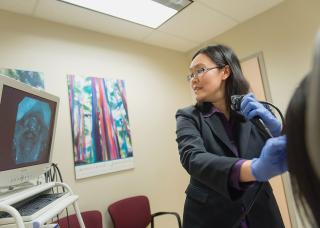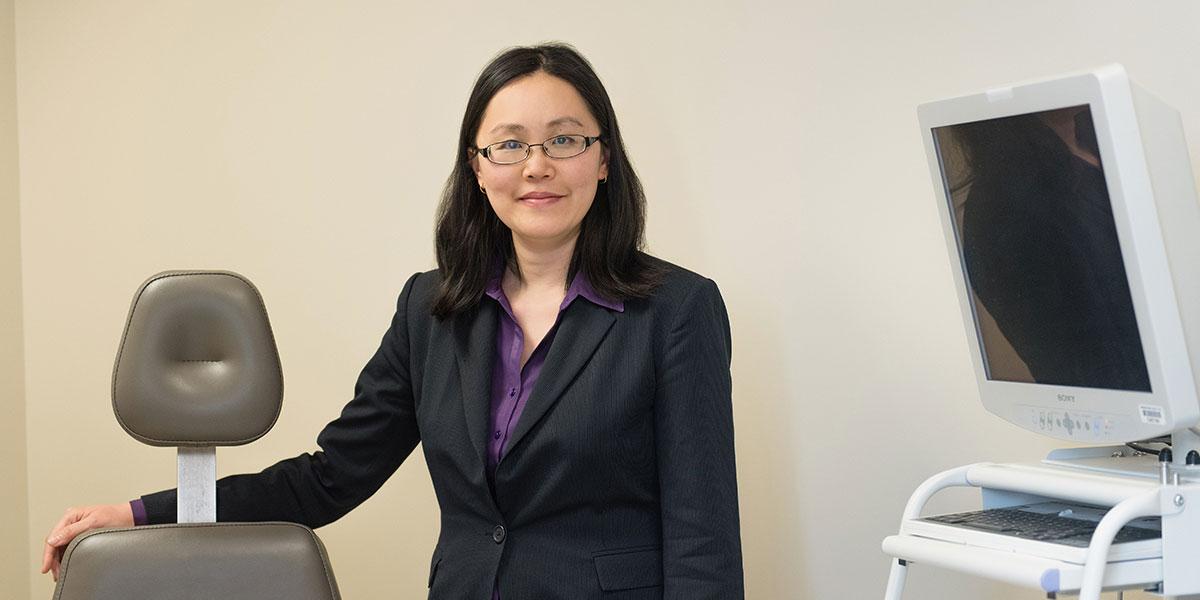Vocal champion


Unless you’re a singer or actor, you’re not likely to think twice about cheering on your favourite sports team or chatting with friends at a noisy restaurant. But according to UBC Clinical Associate Professor of Otolaryngology, laryngologist Dr. Amanda Hu, professional voice users include teachers, lecturers and professors—and they, too, should be mindful of straining their delicate vocal cords.
As one of the province’s three ear, nose and throat surgeons with a specialization in professional voice, Dr. Hu sees patients at Vancouver General Hospital’s Pacific Voice Clinic. And she frequently treats patients suffering from vocal-cord damage as a result of misusing their voice. With World Voice Day having recently marked awareness of voice disorders and vocal care this past April, she wants to spread the word about taking action for good vocal habits.
“Don’t take your voice for granted,” she urges, explaining that overworked vocal cords can become calloused and inflamed—similar to what might happen to feet in ill-fitting shoes. Her advice for those who use their voice professionally: “Don’t yell and scream at sports games. Use a microphone when you’re giving a large lecture. It’s not an ego thing at all—it decreases the strain and load on your voice. It gives you longevity in your career, especially if you’re a teacher or professor.” One-third of teachers end up with vocal cord disorders, she says, so it’s especially important for them to take care of their voice.
Being a voice specialist is a unique profession, one to which Dr. Hu says she gravitated for a number of reasons, one of which is the detailed, meticulous nature of the work. “I knew early on that I wanted to do surgery, because I like working with my hands and I like the instant gratification of making a difference,” she explains. “When I do vocal cord injections or thyroplasties [implants that help restore vocal cord function], I hear a voice change almost instantaneously, so there’s instant gratification. And I enjoy the anatomy of the head and neck area. It’s very delicate.”
Don’t take your voice for granted. Don’t yell and scream at sports games. Use a microphone when you’re giving a large lecture. It’s not an ego thing at all—it decreases the strain and load on your voice. It gives you longevity in your career, especially if you’re a teacher or professor.

Unlike many other surgical specialties, some of Dr. Hu’s operations are conducted while patients are awake. “I need vocal feedback during procedures,” she says. “When I’m trying different implants, I put in the right implant and their voice is restored. Patients are very grateful, very happy. I had one patient almost start crying.”
Some of those patients also fill her clinic with music. As the Laryngologist for Vancouver Opera, Dr. Hu regularly sees professional singers for check-ups or vocal concerns. “I take a peek in their throat and ask them to sing for me—but they’re not usually the ones that damage their voices, because they’re so well-trained. I’m usually just there to give them reassurance.”
And while she can’t name names, she says she has had some famous individuals come through her clinic when they’re struck with vocal concerns on tour. But whether it’s a big-name pop star or dedicated professor, Dr. Hu’s advice is the same: Make a choice to cherish your voice.
When I’m trying different implants, I put in the right implant and their voice is restored. Patients are very grateful, very happy. I had one patient almost start crying.
Find the latest news, updates, events, and useful dates from across UBC, curated for faculty and staff by Internal Communications.
Access a library of resources from multiple UBC websites, all in one place.